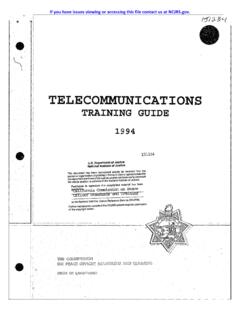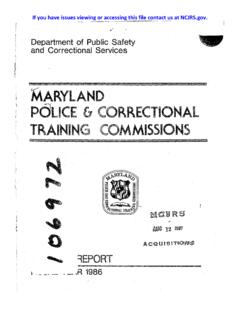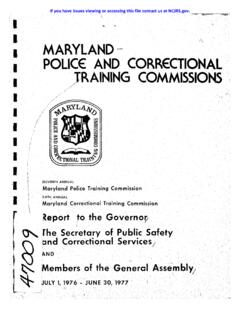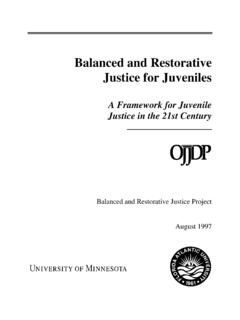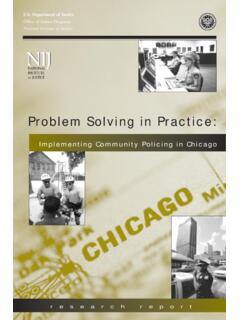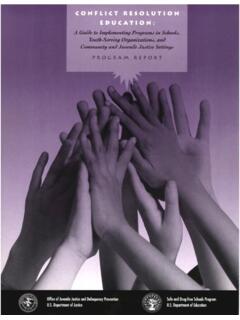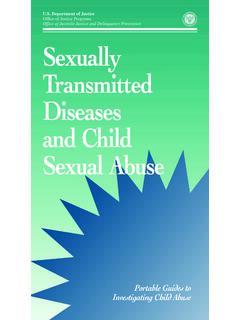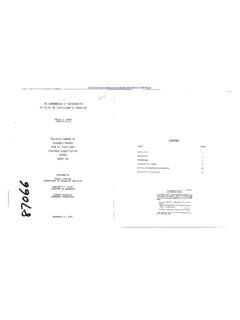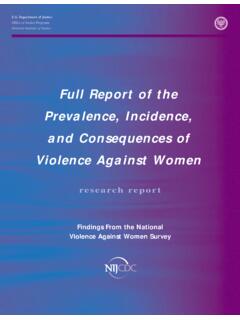Transcription of 'Prosecuting Sexual Assault: A Comparison of Charging ...
1 prosecuting Sexual assault : A Comparison of Charging Decisions in Sexual assault Cases Involving Strangers, Acquaintances, and Intimate Partners* By Cassia Spohn and David Holleran 2004 NCJ 199720 Cassia Spohn, , is with the Department of Criminal Justice, University of Nebraska at Omaha. David Holleran, , is with the Department of Criminal Justice and Criminology, East Tennessee State University. This project was supported by grant 98 WT VX 0003 from the National Institute of Justice, Office of Justice Programs, Department of Justice. Findings and conclusions of the research reported here are those of the authors and do not reflect the official position or policies of the Department of Justice. prosecuting Sexual assault : A Comparison of Charging Decisions in Sexual assault Cases Involving Strangers, Acquaintances, and Intimate Partners The prosecutor plays a key role in the criminal justice system.
2 She or he decides who will be charged, what charge will be filed, who will be offered a plea bargain, and the type of bargain that will be offered. The prosecutor also may recommend the offender s sentence. Although each of these decisions is important, none is more critical than the initial decision to prosecute or not to prosecute. Prosecutors have broad discretion at this stage in the process. There are no legislative or judicial guidelines about Charging , and a decision not to file charges ordinarily is immune from review. According to the Supreme Court, So long as the prosecutor has probable cause to believe that the accused committed an offense defined by statute, the decision whether or not to prosecute, and what charge to file or bring before a grand jury generally rests entirely in his discretion (Bordenkircher v.)
3 Hayes, 434 357, 364 [1978]). The fact that the prosecutor controls the doors to the courthouse (Neubauer, 1988, p. 200) may be particularly important in cases in which the credibility of the victim is a potentially important issue, such as Sexual assault cases. Studies of the Charging process conclude that prosecutors attempt to avoid uncertainty (Albonetti, 1987) by filing charges in cases in which the odds of conviction are good and by rejecting charges in cases for which conviction is unlikely. These studies suggest that although prosecutors assessments of convictability are based primarily on legal factors such as the seriousness of the offense, the strength of evidence in the case, and the culpability of the defendant, legally irrelevant characteristics of the suspect and victim also come into play.
4 In fact, Stanko (1988, p. 170) concludes that the character and credibility of the victim is a key factor in determining prosecutorial strategies, one at least as important as objective evidence about the crime or characteristics of the defendant. In Sexual assault cases, the victim s character, behavior, and credibility may play an especially important role in Charging decisions. In these types of cases, little physical evidence may be present to connect the suspect to the crime, and typically eyewitnesses who can corroborate the victim s testimony may not be available. The likelihood of conviction depends primarily on the victim s ability to articulate what happened and to convince a judge or jury that a Sexual assault occurred.
5 Thus, prosecutors assessments of convictability and their Charging decisions rest on predictions regarding the way the victim s background, character, and behavior may be interpreted and evaluated by other decisionmakers and potential jurors. Frohmann (1997, p. 535) notes that this downstream orientation leads prosecutors to rely on stereotypes about genuine victims and appropriate behavior. Victims whose backgrounds and behavior conform to these stereotypes will be taken more seriously, and their allegations will be treated more seriously than victims whose backgrounds and behavior differ from these stereotypes. Although some researchers contend that victim characteristics come into play in all cases of Sexual assault , others argue that their effect is conditioned by the nature of the case.
6 For example, Estrich (1987, pp. 28 29) maintains that all women and all rapes are not treated equally. Instead, criminal justice officials differentiate between the aggravated, jump-from-the-bushes stranger rapes and the simple cases of unarmed rape by friends, neighbors, and acquaintances. This is consistent with the assertions of Black (1976) and Gottfredson and Gottfredson (1988), who argue that the offender-victim relationship is an important predictor of the outcome of legal proceedings and that crimes between intimates are perceived as less serious than crimes between strangers. If, as these scholars contend, crimes involving strangers are viewed as more serious than crimes involving nonstrangers, victim characteristics particularly those relating to victim credibility should be III 5 3 prosecuting Sexual assault : A Comparison of Charging Decisions in Sexual assault Cases Involving Strangers, Acquaintances, and Intimate Partners better predictors of case outcomes in Sexual assault cases in which the victim and the defendant are intimates or acquaintances than in cases in which the victim and defendant are strangers.
7 Previous research has demonstrated that in more serious cases the outcome is determined primarily by legally relevant factors (Kalven and Zeisel, 1966; Spohn and Cederblom, 1991). In these types of cases, criminal justice officials have relatively little discretion and thus few opportunities to consider the victim s background or behavior at the time of the incident. On the other hand, in less serious cases the appropriate outcome is not indicated clearly by the nature of the crime or other legally relevant factors. This may leave criminal justice officials, including prosecutors, more disposed to take extralegal factors into consideration. This study addressed that issue. The researchers examined the effect of victim, suspect, and case characteristics on prosecutors Charging decisions in three types of Sexual assault cases: those involving strangers, acquaintances, and intimate partners.
8 They tested the hypothesis that the effect of victim characteristics is conditioned by the relationship between the victim and the suspect. They hypothesized that the victim s character, reputation, and behavior at the time of the incident would not affect Charging decisions in cases involving strangers but would affect Charging decisions in cases involving acquaintances and intimate partners. Research Design The study analyzed data on Sexual assaults that resulted in arrests in Kansas City and Philadelphia. The data file included 259 cases in Kansas City and 267 cases in Philadelphia. In Kansas City, selected cases met the following criteria: The defendant was arrested in 1996, 1997, or 1998 for rape, forcible sodomy, Sexual assault , deviate Sexual assault , first-degree statutory rape, or first-degree statutory sodomy.
9 The case was referred to the Office of the prosecuting Attorney for the Sixteenth Judicial Circuit of Missouri by the Kansas City Police Department. The victim was age 12 or older. In Philadelphia, selected cases met these criteria: All cases of rape, involuntary deviate Sexual intercourse, and Sexual assault that resulted in an arrest during 1997 were selected. The victim was age 12 or older. Cases that involved male victims and female suspects were eliminated. III 5 4 prosecuting Sexual assault : A Comparison of Charging Decisions in Sexual assault Cases Involving Strangers, Acquaintances, and Intimate Partners Researchers examined the effect of victim characteristics, offender characteristics, and case characteristics on Charging decisions in cases involving strangers, acquaintances, and intimates.
10 Victim characteristics were subdivided into background factors ( , the victim s gender, race, and age) and blame and believability factors, which are characteristics of the victim that might cause criminal justice officials to blame the victim and/or question her credibility. The researchers controlled for whether the victim physically resisted her attacker or made a prompt report to the police, whether the victim s moral character was in question, and whether the victim engaged in any type of risk-taking activity at the time of the incident. The moral character variable was coded 1 if the police file contained information about the victim s prior Sexual activity with someone other than the suspect, out-of-wedlock pregnancy or birth, pattern of alcohol and/or drug abuse, prior criminal record, work as a prostitute, or work as an exotic dancer or in a massage parlor.
